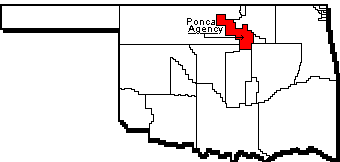 |
 |
 |
The Ponca Agency



The Ponca Agency was established in 1859 for the Ponca Indians In Nebraska. When the bulk of the Ponca Indians moved to Oklahoma Territory in 1877, they were merged into a single agency called the Ponca, Pawnee, and Otoe Agency. From 1882 to 1885, the agency serving the Ponca Indians was called the Ponca, Pawnee, and Otoe Agency and from 1885 to 1901, it was called the Ponca, Pawnee, Otoe, and Oakland Agency.
Between 1901 and 1904, separate Pawnee, Otoe, and Oakland Agencies were reestablished.
In 1912, the Kaw Agency which had been established in 1904, was merged with the Ponca Agency. In 1919, the Otoe and Ponca Agencies were merged with the Pawnee Agency.
In 1921, the Ponca Agency was reestablished for the Ponca, Tonkawa, and the Oto and Missouri Indians. The Ponca Agency was permanently merged with the Pawnee Agency in 1927[1]. The Ponca Agency continued to operate as a subagency under the Pawnee Agency.
PAWNEE NATION OF OKLAHOMA
George E. Howell, President
PO Box 470
Pawnee, OK 74058
918-762-3621
FAX -918-762-6446

The name Pawnee comes from the term pariki, which means "horn," and
refers to the typical hair style. The Pawnee called themselves
Chahiksichahiks, "men of men"
Source:
http://lucy.ukc.ac.uk/EthnoAtlas/Hmar/Cult_dir/Culture.7864 [March
1999]
Pawnee Tribe resides in a part of current
Pawnee Co.,
OK
Pawnee, Oklahoma, named after the Pawnee Indians, is in a part of
Oklahoma formerly known as the Cherokee Outlet, or the Cherokee Strip.
The strip was opened to white settlers on September 16, 1893 through a
series of land runs. Pawnee was first incorporated as a town on April
16, 1894, and was changed from a town to a City on May 18, 1908.

The Ponca Agency had four reservations on the lands of the Cherokee Outlet lying west of the Arkansas River, the Pawnee, Poncas, Otoes and Missouris, and Tonkawa tribes were placed here.

The Pawnee extended south to include some of the lands ceded by the Creeks. The Pawnee reservation was the largest within the limits of the Ponca Agency. These Indians had formerly lived in Nebraska, but in 1876 were removed from their reservation to the new one in Oklahoma. At that time they numbered about two thousand, but within a few years, diseases had reduced them to less than half that number; in spite of the fact that their new home was a beautiful and healthful region of over three hundred thousand acres.

The Poncas, whose old home had been in Dakota, occupied the second reservation. From Dakota they had been moved to Nebraska, and in 1877 were brought to Oklahoma and given more than a hundred thousand acres.

The Otoes and Missouris reservation was to the south of the Ponca lands consisting of about one hundred thirty thousand acres. Their former reservation lay partly in Kansas and partly in Nebraska. They were moved to their new home in 1882 in Oklahoma. The two tribes were small and numbering about three hundred.
The last fluent speakers of Ioway-Otoe-Missouria passed away in the winter of 1996, both in their 90s. There are approximately a half dozen semi-fluent speakers that remain, all born during or prior to WWII.
The existing tribal entities are usually called Otoe, or Otoe-Missouria, and Ioway. The Missouria were absorbed by the Otoe in 1850s and ceased to be autonomous.
The Otoe-Missouria have their tribal offices at Red Rock, Oklahoma (Noble County). The Iowa of Oklahoma offices are located several miles south of Perkins, Oklahoma (Payne County), while the Iowa of Kansas & Nebraska have their tribal complex several miles west of White Cloud, Kansas (Doniphan County).
Source:http://spot.colorado.edu/~koontz/tracks/jgtiombib.htm [March 1999]

The Tonkawa tribe was given the fourth reservation. These Indians were placed north and west of the Poncas on a reservation that had formerly been given to Chief Joseph and a band of Nez Perces (nez pursez) from Idaho. The Nez Perces were not happy there, however, and after a few years they were allowed to return to the hills and mountains of their former home. The Tonkawa's where were then given the lands, were a poor and uneducated people numbering fewer than a hundred. They had formerly lived in Texas, but during the War Between the States, they came to Oklahoma and encamped on the Washita River near Anadarko. Here, in December 1862, other Indians attached them, and a large part of them were killed. The remainder fled, and after living in Texas for a time, was brought to the Oklahoma reservation in 1884.

The Ponca Agency, which controlled these tribes, was located on the Ponca reservation. The agents complained bitterly of their troubles with these Indians. The agents tried to induce them to plant crops and raise livestock, but with little success.

Other Links
OKGenWeb Ponca Agency Message Board
If you would like to adopt a county in OK., visit our Guidelines and Orphan County Site
| |
©
2017 County Coordinator |
|